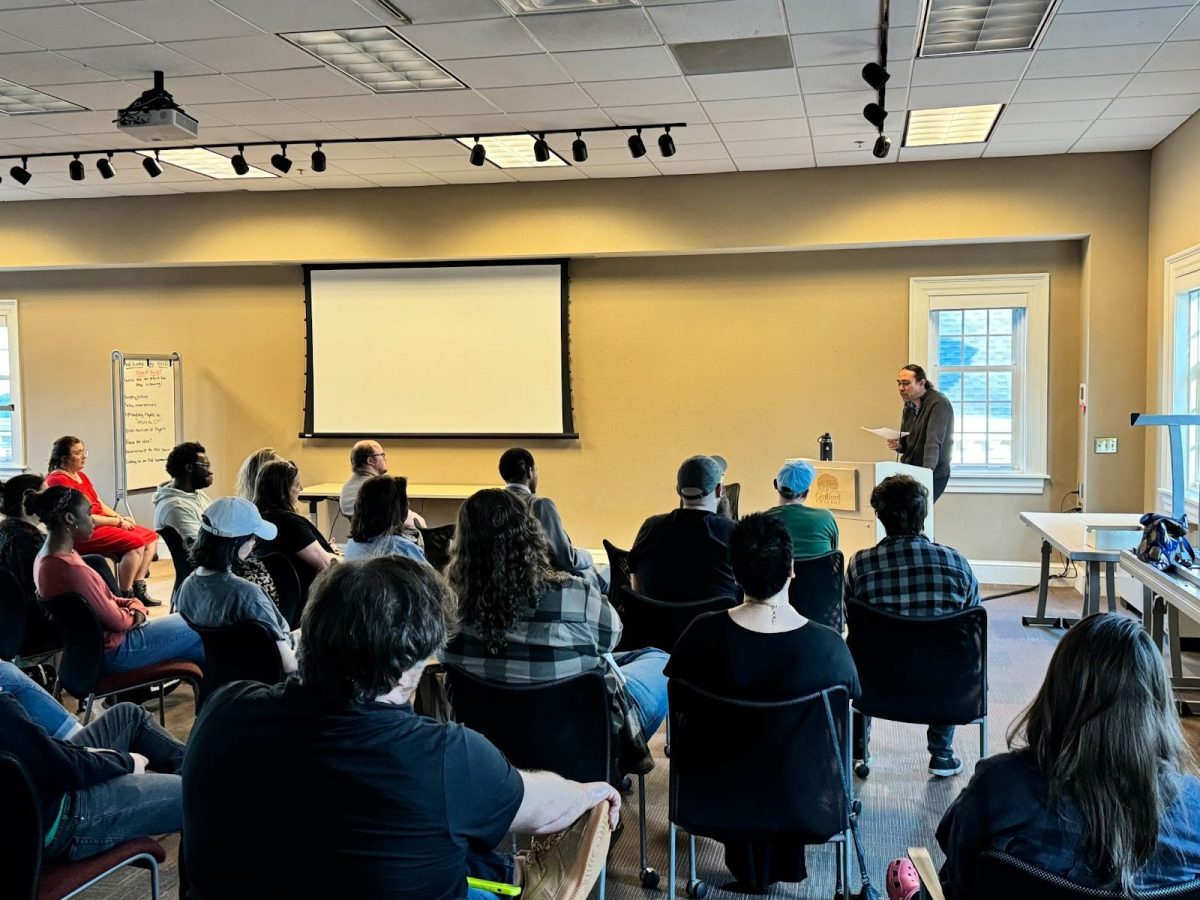“Ayn Rand, capitalism, and Guilford College — it may seem strange to have those words in the same sentence,” said President and Professor of Political Science Kent Chabotar. “Guilford College supports the diversity of speech and of ideas and of business, not being an echo chamber of ideas solely from the right or the left.”
The Gilmer Room, adjacent to the cafeteria in Founders Hall, was seated to capacity as Chabotar began his introduction of Jennifer Burns, author of “Goddess of the Market: Ayn Rand and the American Right.”
Burns visited Guilford College to speak on “Godless Capitalism: Ayn Rand, Faith, and American Politics” on Monday, Feb. 20, speaking first to a crowded Gilmer room and later to the public in Bryan, Jr. Auditorium.
Burns, whose visit was made possible through a BB&T grant, told The Guilfordian that her book is based on her exclusive access to Rand’s unedited letters and journals, a privilege few are ever allowed.
The BB&T grant comes with specific obligations: the college must offer an upper-level interdisciplinary course dubbed “The Moral Foundations of Capitalism” once a year for the 10 years the grant lasts.
Ayn Rand was a self-proclaimed atheist and a Russian-American novelist, philosopher, playwright and screenwriter, who penned novels such as “The Fountainhead” and “Atlas Shrugged.”
Atlas Shrugged is set in a future dystopian America, where overbearing government regulation and taxation have strangled the economy, causing the country’s top capitalists to go on strike, refusing to work for an exploitative system that would redistribute their wealth to those in need.
Senior Annie Young, a business major, told The Guilfordian that though she is a staunch Democrat, she attended the luncheon to try and understand another point of view.
“Burns’ analysis of Rand was very enlightening,” said Young. “I often have walls up and am protective of my stance. I took this opportunity to explore a new ideology.”
Rand’s philosophical systems promote, among others things, a moral argument for selfishness. Rand’s novels oppose the sharing of one’s wealth and the need for giving to the poor on a moral basis.
Burns told The Guilfordian that, oddly, in Republican political races there seems to be a resurgence of Rand’s work fused into the political arena.
“Rand’s ideology is used by those like presidential candidates with Christian constituents, like Ron Paul and The Tea Party, though Rand was a staunch atheist,” said Burns.
Junior James McCabe, a Spanish and business major, told The Guilfordian that he thought Burns’ analysis of Rand was completely accurate.
“I think this was a wonderful speech regarding some very unique ideology that fits capitalism,” said McCabe.
According to Burns, Rand’s ideas have helped conservatives shift the terms of debate from the causes of the economic crisis to the Obama administration’s proposed solutions.
“Conservatives have hailed ‘Atlas Shrugged’ as prophecy, seeing in Rand’s villains the dim outline of liberal presidents from Lyndon Baines Johnson to Jimmy Carter,” said Burns.
Assistant Professor of Business Management and Department Chair Betty Kane was delighted at Burns’ visit to the college, especially after reading Burns’ work.
“I was familiar with Burns and I also had watched various podcasts of her speeches,” said Kane. “Last spring, I had suggested Jennifer as a possible guest speaker. Several of us discussed it and decided to invite her to campus.”
Burns is an assistant professor of history at the University of Virginia where she teaches courses on American political, cultural and intellectual history. She has appeared on The Daily Show with Jon Stewart, NPR’s Here and Now and C-Span’s Book TV.
Assistant Professor of Business Management Darryl Samsell told The Guilfordian that Burns’ speech did a good job in showing the intricacies of Rand’s work.
“It’s much deeper than what people believe,” said Samsell. “And far more complicated than what many pull from her writing.”







Aseel • Mar 15, 2012 at 6:30 am
Atlas Shrugged is a version of a sobsiple eventuality, not a definite and only one. As for things going down the road to where people not only give up but lose the hope that is the engine or turn to alternatives, we may or may not already be past that tipping point.Society is like a roast (hush, listen a second). When it is in the oven, you cook it until it reaches a certain temperature, then take it out. While resting, the roast will continue to rise in temperature. At this point, we are still in the oven but have we hit the preset temperature already. Are we actually beyond it and the roast is ruined? How many people are hopelessly stuck on government pay, monies, or protections? Yeah, not good.Still, there are a lot of ways this can go down. The thing is, it probably is going down. A currency, or all of them, based on faith as they are, in a world of growing doubt? The vampires, werewolves, and heathen barbarians are sharpening their tools as we write. Still, as always, there is hope, even of flesh.